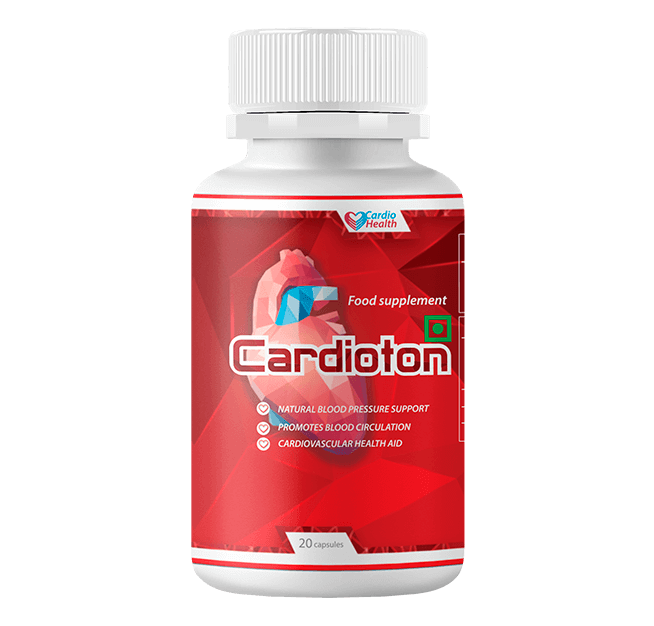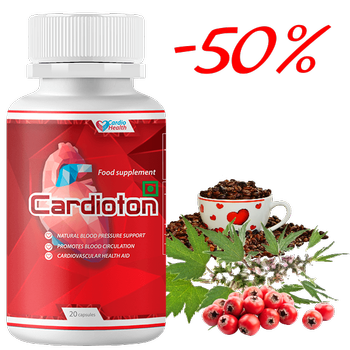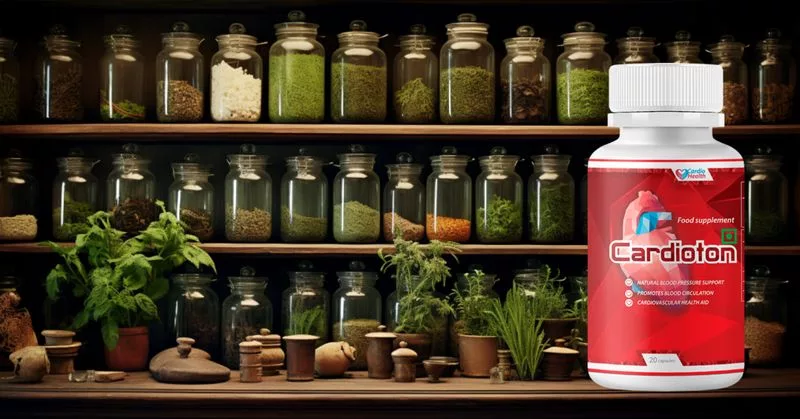In this review, we take a detailed look at the composition of Cardioton, examining the natural ingredients that make up this popular remedy for hypertension and atherosclerosis. We will explore the mechanisms of their action, and analyze in detail the effectiveness of this drug.
Composition and mechanism of action of the components
Cardioton, the innovative dietary supplement aimed at addressing hypertension and atherosclerosis, boasts a strategic selection of natural ingredients. Each component has been carefully chosen for its unique contributions to cardiovascular health.
- Red rice yeast
- Vitamin D
- COENZYME Q10
- African mango extract
- Valerian and motherwort root
- Coffee and hawthorn
- Humulus lupulus
- Melissa Extract
The choice of these ingredients in Cardioton is driven by a synergy of their individual benefits. They collectively target various aspects of hypertension and atherosclerosis, from regulating blood pressure to cleansing blood vessels, managing cholesterol levels, enhancing vascular endurance, and even addressing stress-related factors.
Red rice yeast
Red Rice Yeast, known scientifically as Monascus purpureus, has a rich history rooted in traditional Chinese medicine. It is a type of yeast that grows on rice and has been used for centuries in Asia for its therapeutic properties. The distinctive red color of this yeast is a result of the pigments produced during fermentation.
- Mechanism of Action
Red Rice Yeast contains compounds known as monacolins, with monacolin K being the most notable. Monacolin K functions similarly to statins, a class of drugs used to lower cholesterol levels. It inhibits an enzyme involved in cholesterol production in the liver, leading to reduced cholesterol synthesis.
Red Rice Yeast is produced through the fermentation of rice with Monascus purpureus. During the fermentation process, the yeast produces monacolins, including monacolin K, which is responsible for its cholesterol-lowering effects. After fermentation, the red yeast rice is harvested, dried, and ground into a fine powder. This powder can then be used as a dietary supplement or incorporated into various formulations.
Vitamin D
Vitamin D, often referred to as the “sunshine vitamin,” is a fat-soluble vitamin that plays a vital role in various physiological processes in the human body. It can be synthesized by the skin when exposed to sunlight, making it unique among vitamins.
- Blood Pressure Regulation: Adequate levels of vitamin D are linked to the maintenance of normal blood pressure. It influences the renin-angiotensin-aldosterone system, a key regulator of blood pressure, helping to prevent hypertension.
- Anti-Inflammatory Effects: Vitamin D exhibits anti-inflammatory properties, reducing the inflammatory processes that play a role in the development of atherosclerosis.
- Endothelial Function: Vitamin D supports the health of endothelial cells lining blood vessels. These cells are crucial for maintaining vascular tone and preventing endothelial dysfunction, a hallmark of atherosclerosis.
Vitamin D can be synthesized by the skin when exposed to ultraviolet B (UVB) sunlight. Alternatively, it can be obtained through dietary sources such as fatty fish (e.g., salmon, mackerel), fortified foods, and supplements.
COENZYME Q10
Coenzyme Q10, often abbreviated as CoQ10, is a naturally occurring compound found in every cell of the human body. It is also known by the names “ubiquinone” and “ubidecarenone” due to its ubiquitous presence in cells. CoQ10 was first discovered in 1957 by Dr. Fred Crane at the University of Wisconsin–Madison Enzyme Institute.
Coenzyme Q10 is a vital component in the mitochondria, often referred to as the cell’s powerhouse. It plays a central role in the production of adenosine triphosphate (ATP), the primary source of cellular energy. In the context of cardiovascular health, CoQ10 offers several mechanisms of action:
- Enhanced Cellular Energy Production: The heart is an organ with high energy demands. CoQ10 facilitates ATP production, ensuring that the heart has the energy required for optimal function.
- Antioxidant Protection: CoQ10 is a potent antioxidant that protects cells from oxidative stress. This is particularly relevant in the context of atherosclerosis, as oxidative damage to LDL cholesterol is a key factor in the development of arterial plaques.
- Improvement in Endothelial Function: CoQ10 promotes the health of endothelial cells that line blood vessels, contributing to improved vascular function and reduced risk of atherosclerosis.
Coenzyme Q10 is naturally synthesized in the body, but its production may decline with age or due to certain medical conditions. Dietary sources of CoQ10 include meat, fish, and whole grains.
African mango extract
African Mango Extract, derived from the seeds of the African mango tree (Irvingia gabonensis), is a natural ingredient with a long history of traditional use in West and Central Africa. The fruit of the African mango tree has been a dietary staple in the region for centuries.
- Blood Pressure Regulation: African Mango Extract has been studied for its ability to help regulate blood pressure. It contains bioactive compounds that may contribute to the normalization of hypertension, a significant risk factor for cardiovascular diseases.
- Cholesterol Management: Elevated cholesterol levels are a concern in atherosclerosis. Some research suggests that African Mango Extract may aid in lowering LDL (low-density lipoprotein) cholesterol levels, which is essential in reducing the risk of atherosclerosis.
- Weight Management: Excess body weight is often associated with cardiovascular issues. African Mango Extract is also known for its potential role in supporting weight management efforts, which indirectly contributes to heart health.
African Mango Extract is obtained from the seeds of the African mango fruit. The extraction process involves crushing the seeds to obtain the valuable components. It is available as a dietary supplement, providing a concentrated and standardized form of this natural ingredient.
Valerian and motherwort root
Valerian (Valeriana officinalis) and motherwort (Leonurus cardiaca) are two herbal remedies with deep historical roots in traditional medicine. Valerian, native to Europe and Asia, has been used for centuries to address various health concerns, primarily due to its calming and sedative properties.
- Blood Pressure Regulation: Valerian and motherwort are known for their mild hypotensive (blood pressure-lowering) effects. By helping to relax blood vessels and reduce stress and anxiety, these herbs may contribute to the management of hypertension, a key risk factor for cardiovascular diseases.
- Stress Reduction: Chronic stress and anxiety can have detrimental effects on heart health. Valerian and motherwort’s calming properties may help individuals manage stress, potentially reducing its impact on the cardiovascular system.
Valerian and motherwort root are typically obtained through the harvesting of the plant’s underground parts, including the roots and rhizomes. These parts are then cleaned, dried, and often processed into various forms, such as capsules, tinctures, or teas.
Coffee and hawthorn
Coffee, a beloved beverage enjoyed worldwide, needs no introduction. It originates from the coffee plant’s beans, most notably from the Coffea arabica and Coffea canephora (robusta) species. Coffee’s rich history spans centuries, with its discovery often attributed to African tribes and its popularization later occurring in the Arab world.
Hawthorn, on the other hand, is an herbal remedy derived from the berries, leaves, and flowers of the hawthorn tree (Crataegus species). Its use in traditional medicine can be traced back to ancient Greece, where it was employed for various health purposes, including cardiovascular support.
The inclusion of coffee and hawthorn in Cardioton is a testament to their potential benefits for cardiovascular well-being:
- Antioxidant Properties: Coffee is renowned for its high antioxidant content, particularly chlorogenic acids. These antioxidants help combat oxidative stress, reducing the risk of atherosclerosis and supporting overall heart health.
- Blood Pressure Regulation: Both coffee and hawthorn have demonstrated mild hypotensive effects. They can relax blood vessels, potentially aiding in the management of hypertension, a significant risk factor for cardiovascular diseases.
- Improved Blood Flow: Hawthorn, in particular, is known for its ability to enhance blood circulation. By dilating blood vessels and improving blood flow, it may contribute to reduced plaque buildup in arteries.
Coffee beans are typically harvested, roasted, ground, and brewed to create the beloved beverage. Coffee extracts can also be produced for use in supplements and medications. Hawthorn, on the other hand, involves the extraction of beneficial compounds from its berries, leaves, or flowers. These extracts are then processed into various forms, such as capsules or tinctures, to provide consistent and convenient dosages.
Humulus lupulus
Humulus lupulus, commonly known as hops, is a perennial plant species belonging to the Cannabaceae family. Hops are perhaps best recognized for their role in brewing, imparting flavor and aroma to beer. However, their history extends beyond the realm of brewing. Native to Europe, Western Asia, and North America, hops have been employed in traditional medicine for centuries.
- Blood Pressure Regulation: Hops contain bioactive compounds that can help relax blood vessels, resulting in improved blood flow and potentially lowering elevated blood pressure, a common risk factor for cardiovascular diseases.
- Antioxidant Properties: The flavonoids and polyphenols in hops possess strong antioxidant properties, reducing oxidative stress within the cardiovascular system. This antioxidant activity can mitigate the formation of atherosclerotic plaques and support overall heart health.
- Anti-Inflammatory Effects: Chronic inflammation plays a significant role in the development of atherosclerosis. Hops’ anti-inflammatory properties may help reduce inflammation within blood vessels, preventing the progression of this condition.
Hops are primarily cultivated for their female flowers, commonly referred to as hop cones. These cones contain the valuable compounds responsible for hops’ beneficial effects. To extract these compounds, various methods such as steam distillation, solvent extraction, or supercritical fluid extraction are employed.
Melissa Extract
Melissa extract, derived from the leaves of Melissa officinalis, also known as lemon balm, has a rich history deeply rooted in herbal medicine. This perennial herb, native to the Mediterranean region and parts of Asia, has been cultivated for its therapeutic properties for over two thousand years.
- Blood Pressure Regulation: Melissa contains bioactive compounds, including rosmarinic acid and flavonoids, which have been associated with vasodilatory effects. These compounds help relax blood vessels, potentially leading to reduced blood pressure and improved cardiovascular function.
- Antioxidant Properties: The high antioxidant content in Melissa extract can combat oxidative stress, a contributing factor in atherosclerosis. By neutralizing harmful free radicals, it may protect the integrity of blood vessels and reduce the risk of plaque formation.
- Stress Reduction: Chronic stress is known to exacerbate cardiovascular conditions. Melissa extract has anxiolytic and calming properties that can help alleviate stress and anxiety, potentially reducing the strain on the cardiovascular system.
Melissa extract is typically obtained through a process of steam distillation or solvent extraction from the leaves of the Melissa plant. Steam distillation involves the use of steam to release and capture the essential oil of the plant, which contains the active compounds responsible for its therapeutic effects. This essential oil can then be further processed to create standardized extracts for use in dietary supplements and medications.
Cardioton Dietary Supplement Ingredients Chart
| Ingredient | Characteristics and Properties |
|---|---|
| Red Rice Yeast | – Helps lower cholesterol levels – Supports cardiovascular health – Contains naturally occurring statins with lipid-lowering properties – May reduce the risk of atherosclerosis |
| Vitamin D | – Essential for bone health – Regulates calcium absorption – Supports immune function – May have a role in cardiovascular health |
| Coenzyme Q10 | – Acts as a powerful antioxidant – Supports cellular energy production – May help improve endothelial function – Potential benefits for heart health |
| African Mango Extract | – Contains fiber that may support weight management – May help regulate blood glucose levels – Has antioxidant properties – Supports metabolic health |
| Valerian and Motherwort Root | – Valerian may have calming effects and reduce stress – Motherwort may help regulate heart palpitations – Potential benefits for anxiety and hypertension |
| Coffee and Hawthorn | – Coffee may contain caffeine for alertness – Hawthorn supports cardiovascular health – May help improve blood flow and reduce blood pressure |
| Humulus Lupulus | – Has calming and sedative effects – May help reduce anxiety and stress – Potential benefits for sleep and relaxation |
| Melissa Extract | – Has anxiolytic and calming properties – May alleviate stress and anxiety – Potential benefits for cardiovascular health |
Check out our articles on Cardioton – the best natural remedy for treating hypertension and atherosclerosis in Nigeria!
What is the drug Cardioton (20 capsules): manufacturer of tablets, dietary supplements, benefits
How much do Cardioton capsules cost, where to buy, price in Nigeria
What Cardioton capsules are used for: dosage, side effects, how it works





